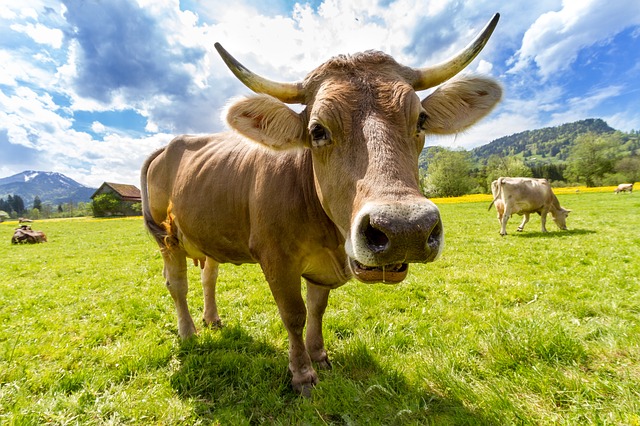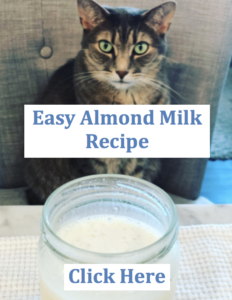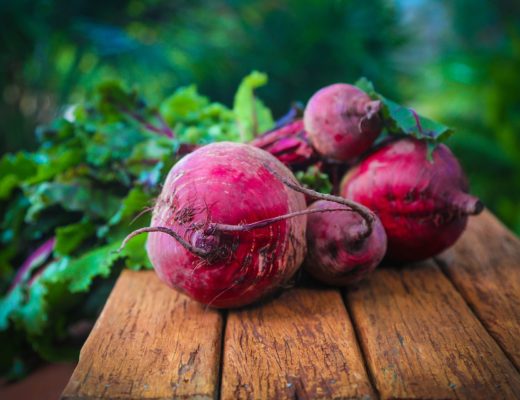There are many reasons to give up milk products. They range from adverse health effects, to the ethical and moral treatment of animals. If you go to the Gastroenterologist for stomach related issues, most likely you’ll be told to give up milk products. The same holds true for Pulmonologist (milk increases mucus production), Dermatologist (milk can cause acne & eczema), and Cardiologist (milk is bad for cholesterol).
I mostly work in gastrointestinal health and one of the first things I encourage my patients to give up is animal milk. This includes any milk products that come from any type of animal. Why? Because it’s one of the most common food triggers out there. It’s super inflammatory to the body and not only does it cause stomach issues, but it can also cause autoimmune problems, acne, high cholesterol, obesity, sinus problems, and even migraines.
Here are Seven Reasons to Give up Milk:
1.Lactose Intolerance
Lactose intolerance is the inability to digest lactose, which leads to many gastrointestinal discomforts. Did you know that over 90% of Asian-Americans, 74% of Native Americans, & 70% of African Americans are lactose intolerant? 1 It’s very common to see in people of Jewish, Hispanic, Italian, and Greek descent. 1 Everyone has some lactose intolerance. In fact, as you age you produce less lactase to break down the lactose found in animal milk products. Approximately 65% of the population loses the ability to digest lactose after infancy.2 Symptoms of lactose intolerance include diarrhea, bloating, excess gas, abdominal pain, indigestion, and nausea. Many people will opt for Lactose Free Cows Milk, but it’s not just the lactose found in the milk that causes issues to the human body.
2.Cow’s Milk Allergy (CMA)
Cow’s milk is the third most common food allergy, after peanut and tree nuts, responsible for food-induced anaphylactic (life threatening) reactions.3 Casein, bovine beta-lactoglobulin (BLG), and alpha-lactabumin (ALA) are some of the major allergens found in milk. Symptoms range from Eczema (atopic dermatitis), abdominal pain, vomiting, diarrhea, constipation, cough, asthma, wheezing, and ear infections.3 Chronic constipation can also be a manifestation of an allergy to cows milk.4
3.Acne & Eczema
It has been theorized that a hormone called IGF-1, found in animal milk, can cause an increase in oil gland production, thus leading to more clogged pores and acne.5 While this hormone is great for baby cows, it actually causes a lot of inflammation in the human body. So it’s not far fetched to think there could be a link to animal milk causing acne, eczema, or other hormonal issues. A recent research study presented at the American Academy of Dermatology showed an association of milk products causing acne.6If you struggle with skin issues, or other endocrine issues, an elimination trial is the best way to find out if milk is one of your triggers.
4.Obesity & High Cholesterol
Milk contains saturated fats, primarily in the form of triglycerides. Diets high in saturated fats can lead to cardiovascular diseases. Trying to lose weight? Stop drinking milk. It’s loaded with calories and fat. Following a plant-based diet can naturally lower cholesterol levels and reduce your risk for cardiovascular disease.7
5.Cancer
More research is showing how the consumption of animal milk products has been linked to increased risk for prostate and breast cancer.8 This may have to do with the IGF-1 hormone found in cow’s milk. Some milk products also have a synthetic hormone in them called recombinant bovine growth hormone, which is used to increase the production of milk. Recombinant bovine growth hormone also increases the risk for developing cancer.9
6.Dairy Contaminants
Anything from recombinant bovine growth hormone, to pesticides, to antibiotics can be found in cow’s milk. Check out this article “It’s not all white: The cocktail of up to 20 chemicals in a glass of milk” and this article “Illegal Antibiotics Could be in your Milk, FDA finds”.
7.Animal abuse
By now you’ve probably seen some of the horrific videos from factory animal farms. If you must consume animal milk, buy from a reputable farmer… preferable someone who is local, and someone who doesn’t use steroids, hormones, or feed the cows soy.
The easiest way to find out if dairy is bothersome to you is to eliminate all forms of animal milk from your diet for at least 4 weeks. If your symptoms improve, there’s your answer. Check out this Video by Dr. Michael Klapper “Dairy Doubts.”
For Dairy Substitutions, click here.
You’re milk free but still having health problems?
Check out my blog on probiotics by clicking here. Different strands of probiotics treat different problems. For instance, Align probiotic is great for Irritable Bowel Syndrome, whereas VSL #3 probiotic works well for Colitis and Crohn’s. A great diet to check out is called Paleo. Stay tuned, I’ll be writing about this soon.
DISCLAIMER
Information in this posting is not intended to diagnose, treat, cure, or prevent any disease. Talk to your medical provider before starting any new supplements or medications.
Sources and References
1What is Lactose Intolerance? , Physicians Committee for Responsible Medicine, 2016, http://www.pcrm.org/health/diets/vegdiets/what-is-lactose-intolerance
2Lactose intolerance, NIH U.S. National Library of Medicine, 2 Jan. 2018, https://ghr.nlm.nih.gov/condition/lactose-intolerance#statistics
3Jarvinen-Seppo, Kirsi M. “Milk allergy: Clinical features and diagnosis.” Milk allergy: Clinical features and diagnosis, 2 June 2017, www.uptodate.com/contents/milk-allergy-clinical-features-and-diagnosis?source=search_result&search=milk&selectedTitle=4~150.
4Dehghani, Seyed-Mohsen et al. “The Role of Cow’s Milk Allergy in Pediatric Chronic Constipation: A Randomized Clinical Trial.” Iranian Journal of Pediatrics 22.4 (2012): 468–474.
5Diet and Acne. Keri, J, Niijhawan, I. Expert Rev Dermatol. 2008;3(4):437-440. https://www.medscape.com/viewarticle/579326_3
6Consumption of dairy in teenagers with and without acne. LaRosa, Caroline L. et al. Journal of the American Academy of Dermatology , Volume 75 , Issue 2 , 318 – 322, www.jaad.org/article/S0190-9622%2816%2930131-1/abstract
7Tuso, Philip J et al. “Nutritional Update for Physicians: Plant-Based Diets.” The Permanente Journal 17.2 (2013): 61–66. PMC. Web. 21 Jan. 2018. https://www.ncbi.nlm.nih.gov/pmc/articles/PMC3662288/
8Kroenke, Candyce H, et al “High-and Low-Fat Dairy Intake, Recurrence, and Mortality After Breast Cancer Diagnosis”. Journal of the National Cancer Institute. Volume 105, Issue 9, 1 may 2013, https://academic.oup.com/jnci/article/105/9/616/986948
9 Recombinant Bovine Growth Hormone. American Cancer Society. https://www.cancer.org/cancer/cancer-causes/recombinant-bovine-growth-hormone.html






No Comments